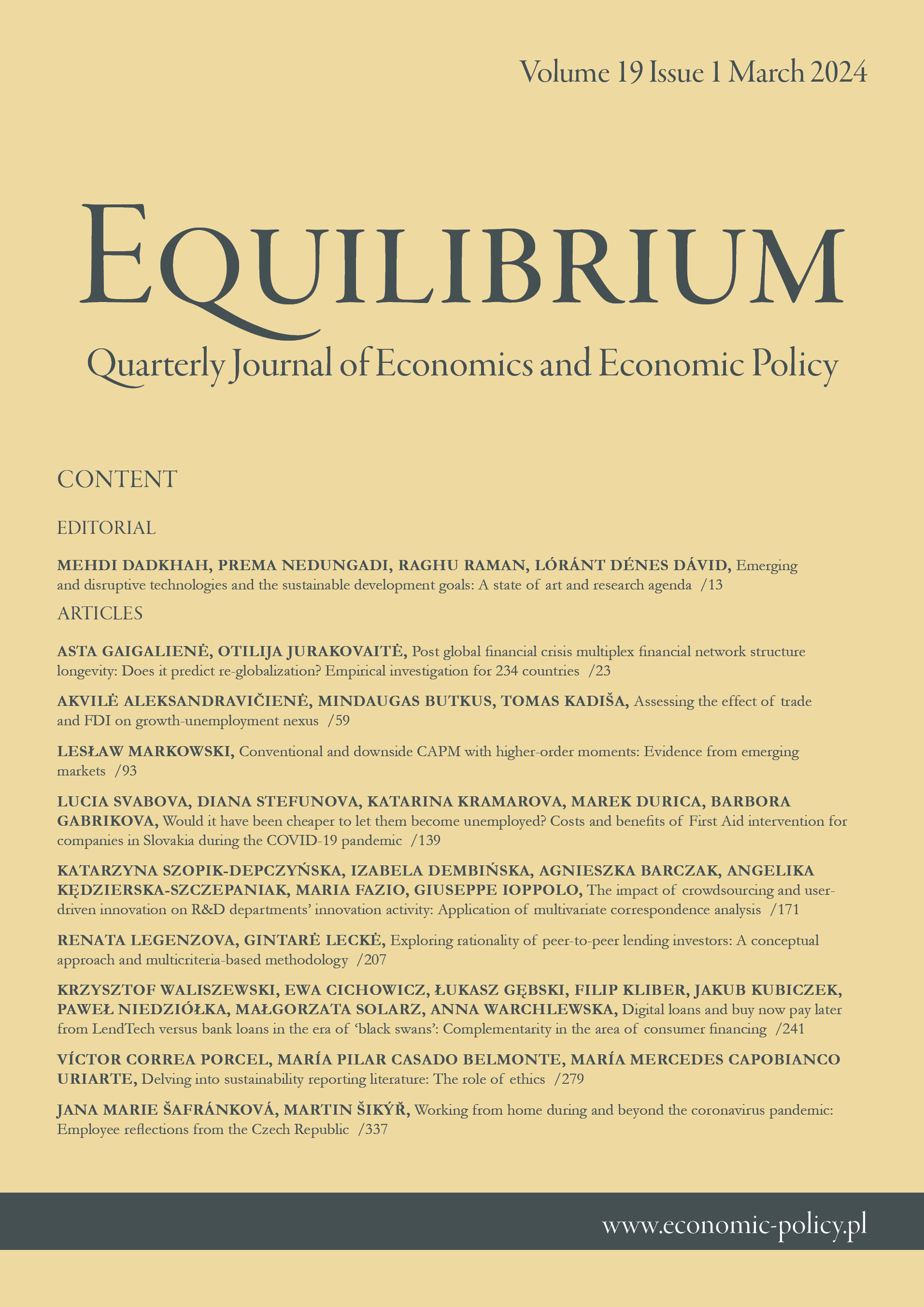The effect of the minimum wage on smoking-related indicators in selected OECD countries
IF 6.2
Q1 ECONOMICS
Equilibrium-Quarterly Journal of Economics and Economic Policy
Pub Date : 2020-09-07
DOI:10.24136/eq.2020.020
引用次数: 1
Abstract
Research background: The amount of the minimum wage is, in some sense, an indicator of the economic level of a country. There are considerable differences in this indicator between the countries of the Organisation for Economic Co-operation and Development (OECD). At the same time, the minimum wage is also an instrument that largely regulates people's behaviour and affects different areas of life. Purpose of the article: The objective of this study is to determine the relations between the minimum wage and individual smoking-related indicators in a sample of selected OECD countries (16 countries). The study answers the question of whether people in countries with lower minimum wages (lower development) smoke more than in countries with higher minimum wages. Methods: Four variables entered into the analytical processing, the minimum wage, daily smokers (age 15+), daily smokers (age 15-24) and tobacco consumption in grams per capita (age 15+). The data were collected between 2011 and 2017. The analysis was carried out in three steps — descriptive analysis, cluster analysis and regression analysis. Findings & Value added: It has been found that the minimum wage negatively affects smoking and tobacco consumption, i.e. in developed countries, where the minimum wage is higher, people smoke less. Regarding the evaluation of minimum wage and tobacco consumption, countries such as Austria, New Zealand or the United States can be considered positive. On the other hand, opportunities for improvement can be seen in countries such as the Czech Republic, Spain, Estonia and Israel. The study highlights the importance of the effect of the minimum wage on selected smoking-related indicators in selected OECD countries. In all three cases, there was a negative relation; therefore, smoking can be expected to decrease, if the minimum wage is increased.在选定的经合发组织国家中,最低工资对吸烟相关指标的影响
研究背景:最低工资的数额在某种意义上是一个国家经济水平的指标。经济合作与发展组织(经合发组织)各国在这一指标上有相当大的差异。同时,最低工资也是一种工具,在很大程度上规范人们的行为,影响生活的不同领域。文章的目的:本研究的目的是确定在选定的经合组织国家(16个国家)的样本中最低工资与个人吸烟相关指标之间的关系。这项研究回答了一个问题,即最低工资水平较低的国家的人是否比最低工资水平较高的国家的人吸烟更多。方法:将最低工资、每日吸烟人数(15岁以上)、每日吸烟人数(15-24岁)和人均烟草消费量(15岁以上)4个变量进行分析处理。这些数据是在2011年至2017年间收集的。分析分三个步骤进行:描述性分析、聚类分析和回归分析。研究结果与附加价值:研究发现,最低工资对吸烟和烟草消费有负面影响,即在最低工资较高的发达国家,人们吸烟较少。关于最低工资和烟草消费的评估,奥地利、新西兰或美国等国家可以被认为是积极的。另一方面,捷克共和国、西班牙、爱沙尼亚和以色列等国家也有改进的机会。这项研究强调了最低工资对某些经合发组织国家中某些与吸烟有关的指标的影响的重要性。在这三种情况下,都存在负相关;因此,如果提高最低工资标准,吸烟人数有望减少。
本文章由计算机程序翻译,如有差异,请以英文原文为准。
求助全文
约1分钟内获得全文
求助全文
来源期刊
CiteScore
9.20
自引率
3.50%
发文量
28
审稿时长
36 weeks
期刊介绍:
Equilibrium. Quarterly Journal of Economics and Economic Policy is a scientific journal dedicated to economics, which is the result of close cooperation between the Instytut Badań Gospodarczych/Institute of Economic Research (Poland) and Polish Economic Society and leading European universities. The journal constitutes a platform for exchange of views of the scientific community, as well as reflects the current status and trends of world science and economy.
The journal especially welcome empirical articles making use of quantitative methods in: Macroeconomics and Monetary Economics, International Economics, Financial Economics and Banking, Public Economics, Business Economics, Labor and Demographic Economics, Economic Development, and Technological Change, and Growth.
Current most preferable topics and special issues:
The economics of artificial intelligence: business potentials and risks;
Digitalization and entrepreneurship in economics;
Sustainable socio-economic development, environmental and ecological economics;
Transition in the energy market (improving energy efficiency, alternative energy sources, renewable energy, energy security).

 求助内容:
求助内容: 应助结果提醒方式:
应助结果提醒方式:


